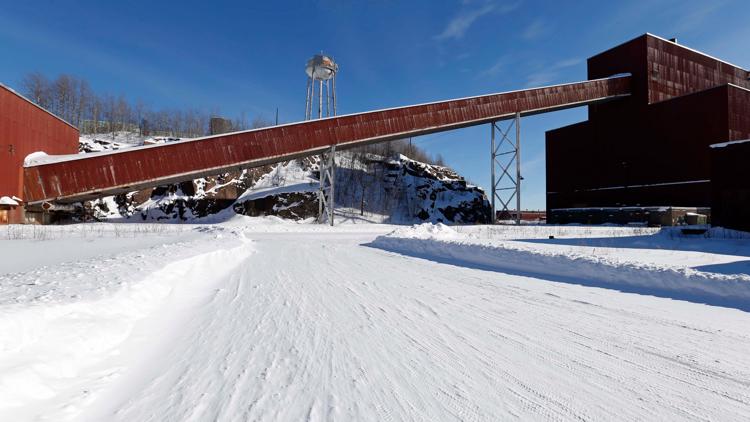ST PAUL, Minn. — Minnesota's highest court ruled to suspend a wastewater permit used in a northern Minnesota mining project Wednesday, saying the company hid critical information about the project's impact on the Lake Superior watershed in order to obtain it.
In the Supreme Court's 6-0 decision to suspend the NewRange, formerly known as PolyMet, National Pollutant Discharge Elimination System (NPDES) permit — which regulates where companies can discharge wastewater within a watershed — it said the Minnesota Pollution Control Agency (MPCA) issued the permit despite "the presence of several danger signals" which it didn't "adequately consider" about the copper-nickel mine project's potential to pollute the watershed.
According to the ruling in favor of various environmental groups and the Fond du Lac Band of Lake Superior Chippewa tribal nation, the MPCA will need to submit comments from federal officials about the project, which could in turn, produce further regulations on pollution limits.
Further, the court said concerns voiced publicly by several environmental groups and the Fond du Lac Band of Lake Superior Chippewa tribal nation were concealed by the MPCA, even destroying documents in which the MPCA asked the federal Environmental Protection Agency not to submit written comments that were critical of the mining project into the public record.
Court discoveries from the 2018 lawsuit and open-records requests by Minnesota-based nonprofit WaterLegacy unearthed documents showing that state regulators had pressured the EPA to withhold its concerns about the mine from public comments.
“Whistleblowers, Freedom of Information Act lawsuits, and the district court hearing helped us learn that the MPCA used a corrupt process to keep EPA’s criticisms of the PolyMet permit secret,” WaterLegacy Advocacy Director Paula Maccabee said. “With this Minnesota Supreme Court decision, it becomes more likely that Minnesota agencies will use a fair process that protects people, rather than polluters.”
A never-published letter from the EPA stated that the federal agency worried that the permits were not “stringent enough” to comply with the federal Clean Water Act and other federal regulations, according to the Supreme Court ruling.
Still, the Minnesota Pollution Control Agency in a press release had said the EPA “had no comments during the period allotted.”
“The motivation of the MPCA — avoid public awareness and scrutiny of the EPA’s concerns because of the intense public interest in the NorthMet project — is contrary to the express ‘purposes of the Administrative Procedure Act’ to increase transparency and ‘public access to governmental information,’" Justice Barry Anderson wrote in the majority opinion.
The other justices also joined a concurrent opinion written by Justice Anne McKeig that more strongly criticized the Minnesota Pollution Control Agency for ignoring and disrespecting the Fond du Lac Band throughout the permitting process.
“By failing to make a record of how the agencies resolved the inadequacies that the EPA identified in the draft permit, the MPCA continued this country’s centuries-long history of threatening tribal resources with political disregard of tribal rights," McKeig wrote.
Following the news Wednesday, representatives from the groups Minnesota Center for Environmental Advocacy (MCEA) and Friends of the Boundary Waters, celebrated the court's ruling.
“Today the Minnesota Supreme Court recognized that what our state agencies do during permit review processes matters. Unfortunately in the case of PolyMet, our state MPCA violated the public’s trust, and state law, when it suppressed crucial scientific concerns about the water permit,” said Joy Anderson, senior staff attorney for MCEA, in a statement.
The decision put another roadblock in NewRange's plans to operate the state's first copper-nickel mine in the city of Babbit, about an hour-and-a-half's drive north of Duluth. Over the last nearly two decades, the site — a former taconite processing plant — has been reviewed at length regarding its potential environmental impacts on the region.
In a prior appeal, the court considered the waste produced from sulfide ore, saying it "has the potential to release acid rock drainage," which would "release toxic metals and sulfate that could seep into nearby surface waters and groundwaters.”
Additionally, the U.S. Army Corps of Engineers in June revoked a critical water quality permit for the project. The Corps said the permit did not comply with the water quality standards set by the Fond du Lac Band of Lake Superior Chippewa, whose reservation on the St. Louis River is downstream from the mine and processing plant sites.
Other environmentalists have expressed fear it could pollute pristine waters and destroy habitat for gray wolves and Canada lynx. The project would be located near tributaries feeding the St. Louis River, 175 river miles upstream from Lake Superior.
In a statement Wednesday evening, NewRange said it "welcomes working with stakeholders" on meeting state standards to once again retain the permit.
"NewRange looks forward to working with the respective state, federal, and tribal agencies to address the court’s ruling," the statement read. "The Court recognized that the permit may be protective of the state, tribal, and federal waters, and will improve water quality in key areas. NewRange is confident that the additional proceedings will confirm the project protects water quality for all."
Pollution Control Agency spokeswoman Andrea Cournoyer said in a statement in response to the ruling that the agency continues to “seek clarity from the federal government and the company on how to address these critical water quality issues."
Watch more local news:
Watch the latest local news from the Twin Cities and across Minnesota in our YouTube playlist:



